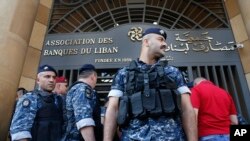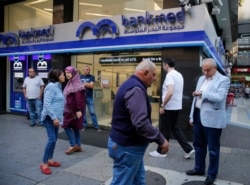Lebanese banks reopened Friday after closing two weeks ago amid nationwide anti-government protests that have crippled the country.
Much of the protesters’ ire has been directed at the banks, which they perceive to be part of the political establishment that has been accused of rampant corruption and the provision of poor public services.
Officials were concerned the reopenings would prompt widespread savings withdrawals, but the banks appeared to have been operating normally by midday.
The reopenings came as the demonstrations entered a third week, during which protesters and security forces have faced off in an ongoing civil disobedience campaign to oust the country's ruling elite.
Citizens demanding political change have been maintaining roadblocks across the tiny Mediterranean country, only allowing security and medical personnel through.
Protesters are standing in rare national unity, also demanding a complete overhaul of Lebanon's sectarian-based politics.
Jordanian political analyst Labib Kamhawi says the widespread discontent among Lebanese citizens and their demands to end the entire structure of governance have been expected for some time, and now the Lebanese — be they Christian, Sunni, Shi'ite or Druze — say they have had enough.
"The continuous deterioration in all aspects of life, including environmental issues, rampant corruption, the garbage issue a couple of years ago, now the fires that hit Lebanon and destroyed a good lot of its greenery, unfair taxation introduced by the draft budget, which was canceled, created a feeling amongst Lebanese that they are all in the same boat and a general conviction that they cannot trust the political status quo," Kamhawi said. "All of these guys are corrupt, and they have to go. This prosperous nation has become really poor."
Prime Minister Saad Hariri resigned earlier in the week, a key demand of protesters who followed the destruction of their tents by Shi'ite Hezbollah forces, but President Michel Aoun has asked him to stay on as a caretaker prime minister. In Lebanon's delicate religious mosaic, where the president is a Christian, the prime minister a Sunni Muslim and the speaker of parliament a Shi'ite, some believe that Hariri might lead a technocratic administration to address the financial crisis and meet protester demands.
But Maha Yahya, who heads the Carnegie Middle East Center in Beirut, doesn't see that happening. Protesters, she said, do not accept it, adding that Hariri is in a "standoff with Lebanon's Shi'ite Hezbollah." She said that "without the full support of Lebanon's political class … any government could be doomed."
Kamhawi says that now that the Lebanese are unified in their revolt, without reference to their religious affiliations, they will likely demand a new political system and will not accept Aoun as president.
"A new system has to be rebuilt as a Lebanese system and not as a confessional system," Kamhawi said. "If Aoun feels that he has to leave, he might entrust the formation of the government to the head of the army and he will be serving as acting president. The government headed by the military could oversee a new referendum or a new constitution. It could happen. I don't see any other way out, if they insist that Aoun should resign."
Analysts say that Lebanon faces a looming financial and economic crisis.
"If there is an economic collapse and the Lebanese pound loses value," Yahya said, "the fallout, in terms of public anger, could pale in comparison to what we've seen so far."
Lebanon is $86 billion in debt, which accounts for 150% of its gross domestic product.
The crisis has raised concerns among within the U.S. Congress and the Trump administration.
In a Thursday interview with VOA Persian in Washington, Democratic Senator Chris Van Hollen said he worries about the situation in Lebanon. "We need to make sure that we don't see a situation where it descends into a civil war again," he said, referring to Lebanon's 15-year conflict that raged from 1975 to 1990. "My view is the United States should remain very engaged with Lebanon both in terms of security issues but also economically," Van Hollen added.
Earlier this week, U.S. Secretary of State Mike Pompeo issued a statement calling on Lebanon's political leaders to "urgently facilitate the formation of a new government that can build a stable, prosperous, and secure Lebanon that is responsive to the needs of its citizens."
Pompeo echoed what he said were the Lebanese people's demands for an "efficient and effective" new government that carries out economic reform and ends "endemic" corruption. He went on to say, "Any violence or provocative actions must stop, and we call upon Lebanon's army and security services to continue to ensure the rights and safety of the protesters."
VOA Persian's Shahla Arasteh contributed to this report from Washington.










